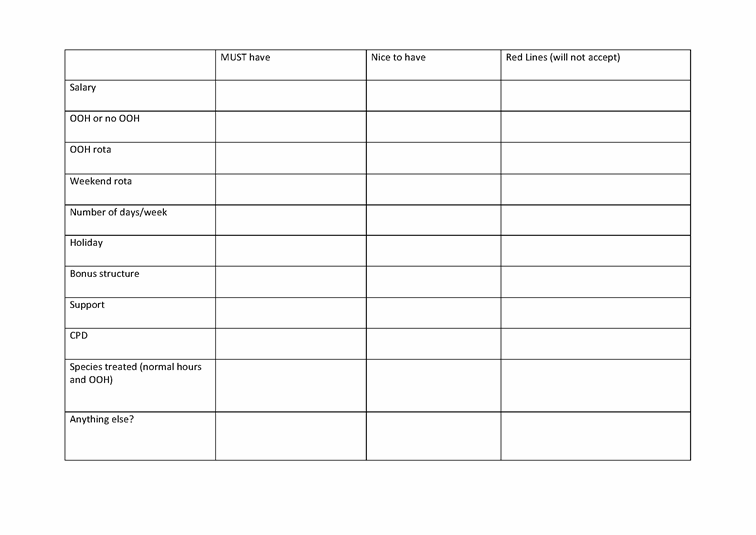Standing up for the veterinary profession
08 Aug 2024
13 Apr 2021 | Paul Horwood
We are all negotiating all day, from convincing our kids to put on their clothes and come downstairs, to deciding who is making the tea round next. But in this blog, Paul Horwood looks at a more formal form of negotiation - negotiating pay, either at a job interview, or a pay review.

A few points before we get into the tips and the detail, remember that unlike haggling over a price at a market, or with a used car salesman, you will have a long-term relationship with the other party after the negotiation is concluded. Hopefully you will end up working within the company and possibly working with the other person, for years to come. Therefore, it is vital that both parties walk away with a satisfactory outcome. If either party feels ripped off, then this will fester and cause problems in the future.
Before you get to the negotiation, it is really important to prepare and do your research. You don’t want to be surprised during the discussion.
Put yourself in the shoes of the other party, what are they looking for, what value do you have, that they are wanting to buy with the salary on offer? Perhaps it’s a steady pair of hands, or a junior member of the team to be developed, or perhaps it’s someone who can come in and expand the range of services supplied at the clinic. If you can identify what is important for the other party, then you can ensure you highlight those points, and make it very clear why you are delivering the value they want.
If this is a pay review, can you get access to your financial performance, think about what else you bring to the business, improving the social media strategy, attending local shows, leading clinical discissions, re-writing protocols, sorting out the rota etc.
Next ensure you know your worth, talk to your alumni (friends from years above that you know), check out salary surveys, look at equivalent job adverts (which are starting to state salary ranges now).
Before you have the actual meeting, do some preparation, do you know what are you prepared to negotiate on?
You don’t want to be put on the spot and feel pressured into something, so beforehand, write down everything that is within the job.
When we are under pressure, feeling anxious, and have the adrenaline rush, we overestimate our ability and underestimate the risk. So, it is very important to pre-make as many decisions as possible before the actual meeting, or at least have a Plan A, Plan B, Plan C.

Recreate the table above and fill out as much as you can.
For example, you might like to have £40k salary, but will not accept less than £35k.
You might like a 1:5 OOH rota but will not accept less than 1:4.
You would like 25 days holiday, will not accept less than 20.
Must have support for orthopaedic cases.
So now you can accept a salary of £38k, (a bit less than you wished for), but with 26 days holiday (a bit more holiday than you expected). Or a 1:4 rota but a commitment to fund orthopaedic surgery CPD/qualification.
By having pre-planned what you will negotiate on, and where your limits are, you can confidently come to an acceptable compromise. (Remember it’s not ALL about money)
Finally, unless you are very experienced at negotiating, and feel very relaxed and comfortable in the setting, then I would suggest you don’t make any final acceptance at the end of the negotiation. Thank the other team and tell them you will get back to them shortly; that afternoon, tomorrow, after the weekend. (It’s important not to wait too long, as that is rude and creates difficulties and pressure for the other side).
Have a think over the deal you have negotiated, in a relaxed and non-pressured situation. (There is a reason the timeshare scandals of the 1980s were so successful, the pressure selling approach works by not allowing you to leave till you’ve made a (bad) decision).
Is it really the best for you? If the job is great but you are unclear or unhappy about one or two things, then go back and ask.
If it’s the perfect role, but the salary is still a little below what you were hoping for and expecting, then one option could be to say
“Thank you for the offer, the salary is a little below what I was hoping for, but everything else about the job is great, would you put in writing a commitment to have a 6m pay review rather than waiting a full 12m, so I can prove to you that I am worth £XXX more.”
This way you can prove to the employer that you are worth the increase, and (if you do prove that) you will only be on the lower salary for 6m rather than 12m, before going to salary you were aiming for.
For more info, have a look at my video on VetYou website discussing negotiation.
Find out more about our Good workplaces policy position and access our resources.
Get tailored news in your inbox and online, plus access to our journals, resources and support services, join the BVA.
Join Us Today